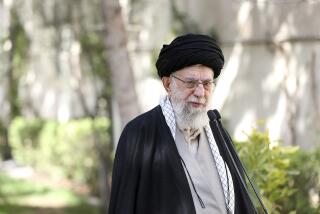Iran points at Syrian rebels in warning about chemical weapons
- Share via
Echoing the words of President Obama, the Iranian foreign minister reportedly said Tuesday that unleashing chemical weapons in Syria would be a “red line” for Tehran.
But Ali Akbar Salehi also suggested rebels were to blame for such attacks, not the Syrian government, with which Iran is closely allied.
The United Nations should “identify the main culprit behind the use of chemical weapons in the country before it is too late and the situation gets out of control in Syria,” Salehi told reporters Tuesday, according to Fars News Agency.
The White House recently announced there was evidence that Syrian government forces had used sarin gas during warfare and called for a U.N. investigation. Rebels and the government have blamed each other for alleged attacks in December and March.
President Obama warned last year that using chemical weapons or handing them over to terrorists would be a “red line” for the U.S. -- but did not say what Washington would do if that red line were crossed. The Iranian foreign minister reportedly used the same phrase Tuesday in Tehran.
“We have always emphasized that using chemical weapons, by anyone, is our red line,” Salehi said, according to the semi-official Iranian Students News Agency.
His statements reflect the opposing stands that Iran and the U.S. have taken on the enduring conflict in Syria. Tehran is allied with Syrian President Bashar Assad, while the U.S. has pledged food and medical supplies to the opposition trying to topple him.
Both sides in the Syrian conflict have released videos purporting to show the deadly results of poison gas. The U.N. has pushed for unfettered access to Syria to probe whether chemical weapons have been used; a team of investigators is on standby and waiting to enter the country, the U.N. said Monday.
Salehi told reporters he had sent a letter to U.N. Secretary-General Ban Ki-moon urging him to begin the probe. “We oppose any type of production, stockpiling and use of weapons of mass destruction, and this stance is the clear message and consistent policy of Iran,” Salehi said Tuesday, according to Iranian media. Such weapons are prohibited under a fatwa, a religious edict, issued by Supreme Leader Ayatollah Ali Khamenei, he added.
Iran is under international sanctions for refusing to halt a nuclear program that Western powers allege is aimed at the production of nuclear weapons.
ALSO:
Syria: Huge new bombing in Damascus kills at least 13
2 killings shatter relative calm between Israelis, Palestinians
Pakistani court bans Pervez Musharraf from public office for life
Special correspondent Ramin Mostaghim in Tehran contributed to this report.
More to Read
Sign up for Essential California
The most important California stories and recommendations in your inbox every morning.
You may occasionally receive promotional content from the Los Angeles Times.








